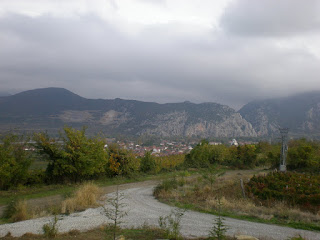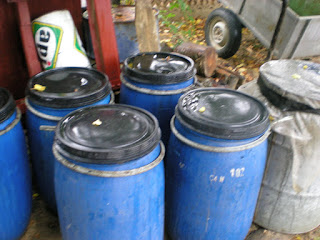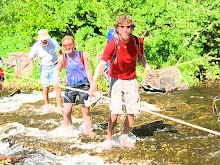Field Trip!
Along with the many meetings and technical sessions scheduled during training, Peace Corps has also included a few field trips to round out our education in Macedonia. We had one such field trip this past weekend and we had a fabulous time. The first stop on our field trip was to Stobi, an ancient Roman city in southern Macedonia. The city was at the intersection of the Axiom and Vardar roads, which were the main "highways" through the Balkans leading to Constantinople and into Helios.
Today it is a major archaeological excavation site--when funding is available-- with the relics of an ancient church, a few baths, some homes, an amphitheater and a jail, in which skeletons were found still chained to the rock walls. The really amazing thing about our visit was the virtually unbridled access we had to the site. If Stobi were in Greece or Italy, it would undoubtedly be roped off and the tour carefully orchestrated. Not only is there no entrance fee at Stobi, but our group was allowed to get up close and personal with the ruins. In addition to these few pictures, there's a bunch more in our photos file on the right sidebar.
From the ancient wonder of Stobi our group proceeded south the Demir Kapija in the heart of Macedonia's burgeoning wine country. We visited a new winery perched atop a hill with a beautiful view of the town and surrounding rocky peaks. Those peaks actually serve as a barrier between the Mediterranean climate of Greece and the continental climate of the Balkans, so Demir Kapija gets a pretty interesting mix of weather, depending upon which system is more dominant. As Macedonia approaches EU membership, much of its economic hopes rest on tourism--along with its natural beauty and history (e.g. Stobi), Macedonia is looking to be Europe's next big wine producer. With that in mind, many of the wineries are renovating in an effort to be a real destination, complete with hotels and restaurants. Still, by American standards, the wine is very inexpensive and quite good...so friends and family, when you visit us here, you can be sure Macedonian wine will be on the itinerary!










 Jillian helps out with the special sauce
Jillian helps out with the special sauce Let the fermenting begin!
Let the fermenting begin! The village church
The village church




